Leveraging Digital Technologies in Supply Chains for Efficiency
VerifiedAdded on 2020/04/21
|14
|3150
|70
AI Summary
The integration of digital technologies such as Enterprise Resource Planning (ERP) systems plays a critical role in enhancing supply chain management. These technologies facilitate better coordination across various components of the supply chain by providing real-time data and analytics that lead to informed decision-making. By adopting ERP solutions, companies can achieve greater operational efficiency, reduce errors, and minimize risks associated with manual processes. Furthermore, digital transformation supports environmental sustainability efforts within supply chains as highlighted by Abbasi and Nilsson (2012), who emphasize the need for environmentally sustainable practices. As Brindley (2017) notes, efficient management of supply chain components, such as suppliers and dealers, can mitigate risks significantly when digital tools are employed. The adoption of cloud-based ERP systems also presents benefits like scalability and cost-effectiveness while addressing challenges such as data security and integration complexities. Overall, the strategic implementation of digital technologies in supply chains not only improves operational performance but also contributes to long-term sustainability goals.

LOGISTICS AND OPERATIONS FOR OIL AND GAS
Paraphrase This Document
Need a fresh take? Get an instant paraphrase of this document with our AI Paraphraser
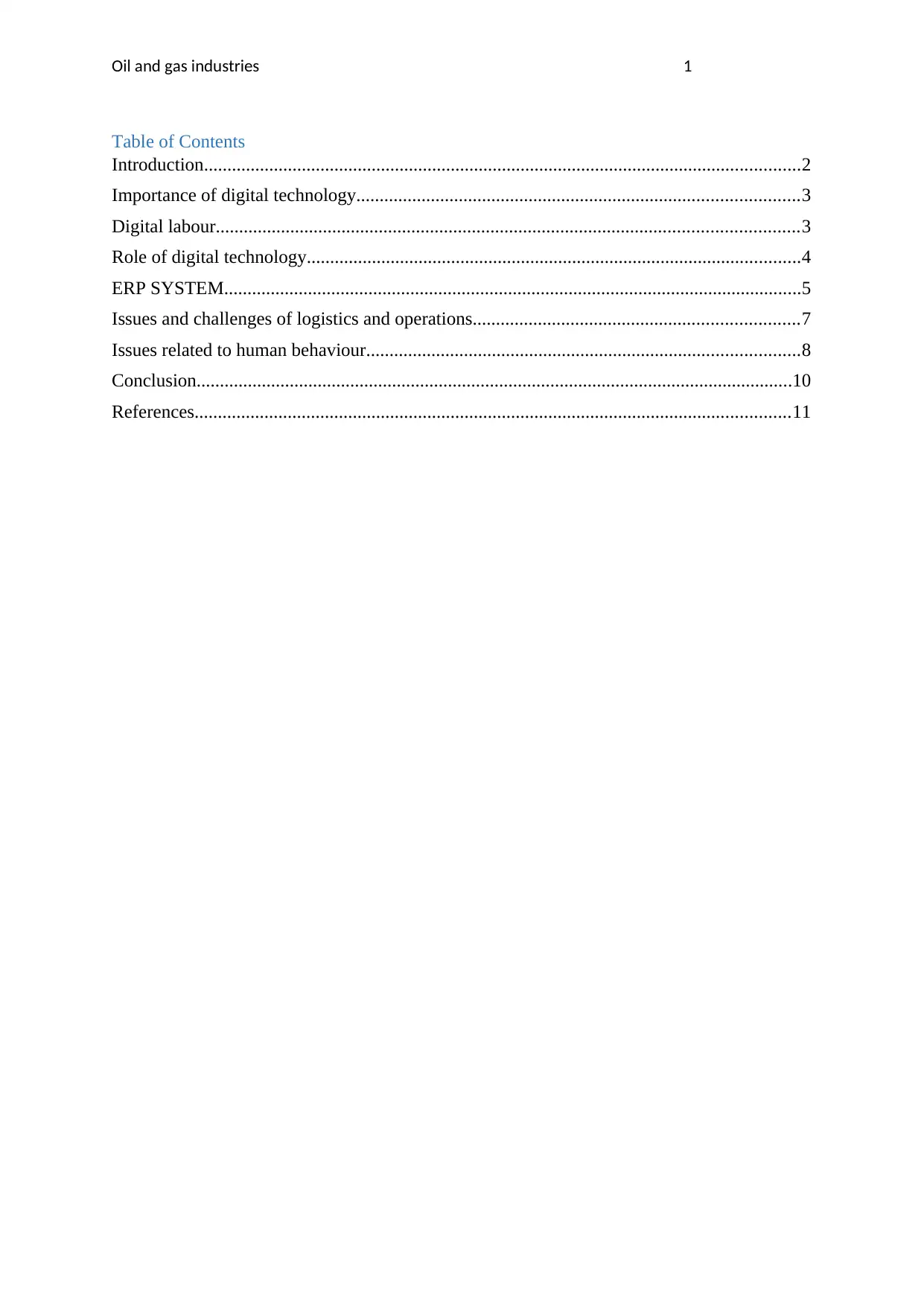
Oil and gas industries 1
Table of Contents
Introduction................................................................................................................................2
Importance of digital technology...............................................................................................3
Digital labour.............................................................................................................................3
Role of digital technology..........................................................................................................4
ERP SYSTEM............................................................................................................................5
Issues and challenges of logistics and operations......................................................................7
Issues related to human behaviour.............................................................................................8
Conclusion................................................................................................................................10
References................................................................................................................................11
Table of Contents
Introduction................................................................................................................................2
Importance of digital technology...............................................................................................3
Digital labour.............................................................................................................................3
Role of digital technology..........................................................................................................4
ERP SYSTEM............................................................................................................................5
Issues and challenges of logistics and operations......................................................................7
Issues related to human behaviour.............................................................................................8
Conclusion................................................................................................................................10
References................................................................................................................................11
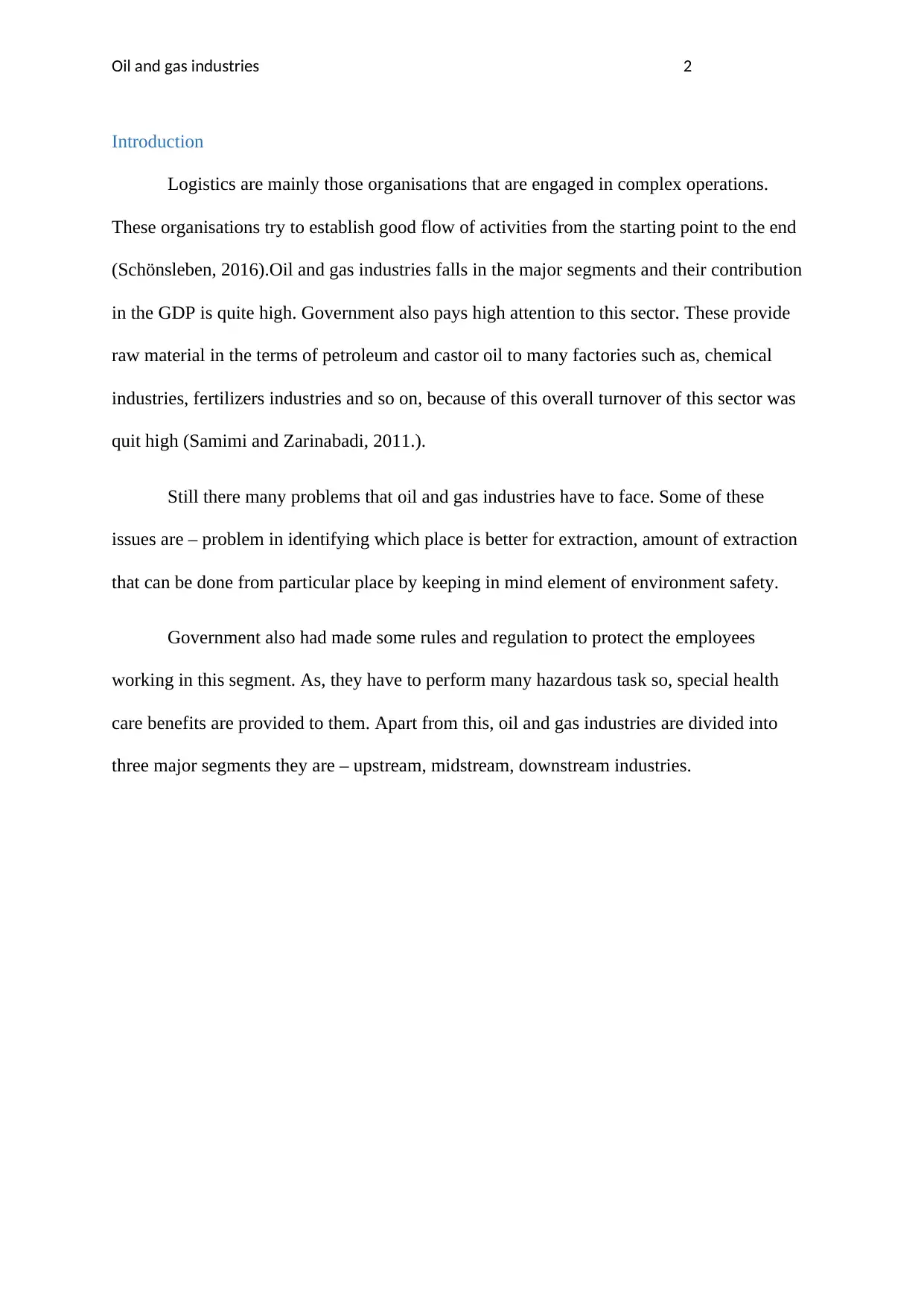
Oil and gas industries 2
Introduction
Logistics are mainly those organisations that are engaged in complex operations.
These organisations try to establish good flow of activities from the starting point to the end
(Schönsleben, 2016).Oil and gas industries falls in the major segments and their contribution
in the GDP is quite high. Government also pays high attention to this sector. These provide
raw material in the terms of petroleum and castor oil to many factories such as, chemical
industries, fertilizers industries and so on, because of this overall turnover of this sector was
quit high (Samimi and Zarinabadi, 2011.).
Still there many problems that oil and gas industries have to face. Some of these
issues are – problem in identifying which place is better for extraction, amount of extraction
that can be done from particular place by keeping in mind element of environment safety.
Government also had made some rules and regulation to protect the employees
working in this segment. As, they have to perform many hazardous task so, special health
care benefits are provided to them. Apart from this, oil and gas industries are divided into
three major segments they are – upstream, midstream, downstream industries.
Introduction
Logistics are mainly those organisations that are engaged in complex operations.
These organisations try to establish good flow of activities from the starting point to the end
(Schönsleben, 2016).Oil and gas industries falls in the major segments and their contribution
in the GDP is quite high. Government also pays high attention to this sector. These provide
raw material in the terms of petroleum and castor oil to many factories such as, chemical
industries, fertilizers industries and so on, because of this overall turnover of this sector was
quit high (Samimi and Zarinabadi, 2011.).
Still there many problems that oil and gas industries have to face. Some of these
issues are – problem in identifying which place is better for extraction, amount of extraction
that can be done from particular place by keeping in mind element of environment safety.
Government also had made some rules and regulation to protect the employees
working in this segment. As, they have to perform many hazardous task so, special health
care benefits are provided to them. Apart from this, oil and gas industries are divided into
three major segments they are – upstream, midstream, downstream industries.
⊘ This is a preview!⊘
Do you want full access?
Subscribe today to unlock all pages.

Trusted by 1+ million students worldwide
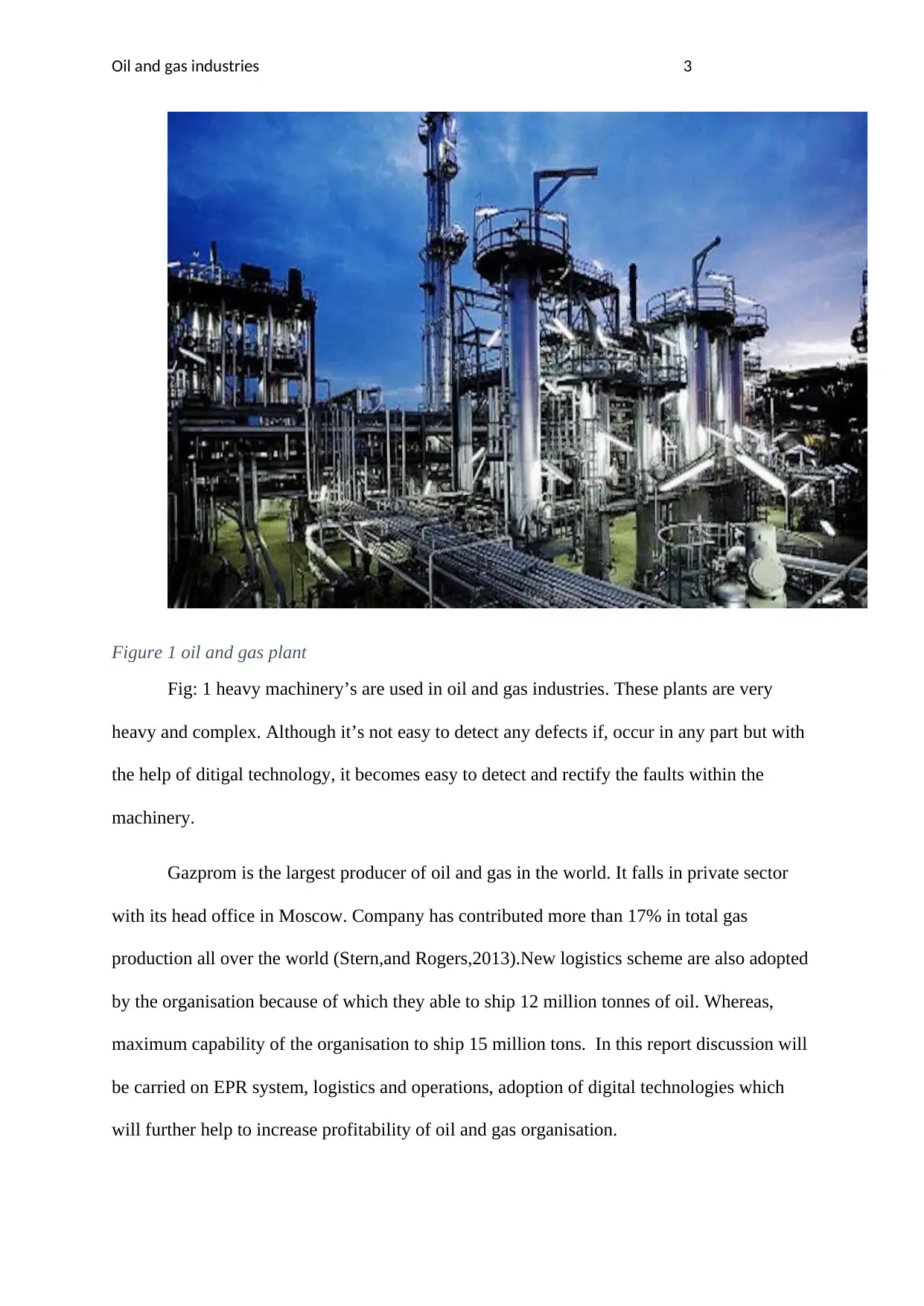
Oil and gas industries 3
Figure 1 oil and gas plant
Fig: 1 heavy machinery’s are used in oil and gas industries. These plants are very
heavy and complex. Although it’s not easy to detect any defects if, occur in any part but with
the help of ditigal technology, it becomes easy to detect and rectify the faults within the
machinery.
Gazprom is the largest producer of oil and gas in the world. It falls in private sector
with its head office in Moscow. Company has contributed more than 17% in total gas
production all over the world (Stern,and Rogers,2013).New logistics scheme are also adopted
by the organisation because of which they able to ship 12 million tonnes of oil. Whereas,
maximum capability of the organisation to ship 15 million tons. In this report discussion will
be carried on EPR system, logistics and operations, adoption of digital technologies which
will further help to increase profitability of oil and gas organisation.
Figure 1 oil and gas plant
Fig: 1 heavy machinery’s are used in oil and gas industries. These plants are very
heavy and complex. Although it’s not easy to detect any defects if, occur in any part but with
the help of ditigal technology, it becomes easy to detect and rectify the faults within the
machinery.
Gazprom is the largest producer of oil and gas in the world. It falls in private sector
with its head office in Moscow. Company has contributed more than 17% in total gas
production all over the world (Stern,and Rogers,2013).New logistics scheme are also adopted
by the organisation because of which they able to ship 12 million tonnes of oil. Whereas,
maximum capability of the organisation to ship 15 million tons. In this report discussion will
be carried on EPR system, logistics and operations, adoption of digital technologies which
will further help to increase profitability of oil and gas organisation.
Paraphrase This Document
Need a fresh take? Get an instant paraphrase of this document with our AI Paraphraser
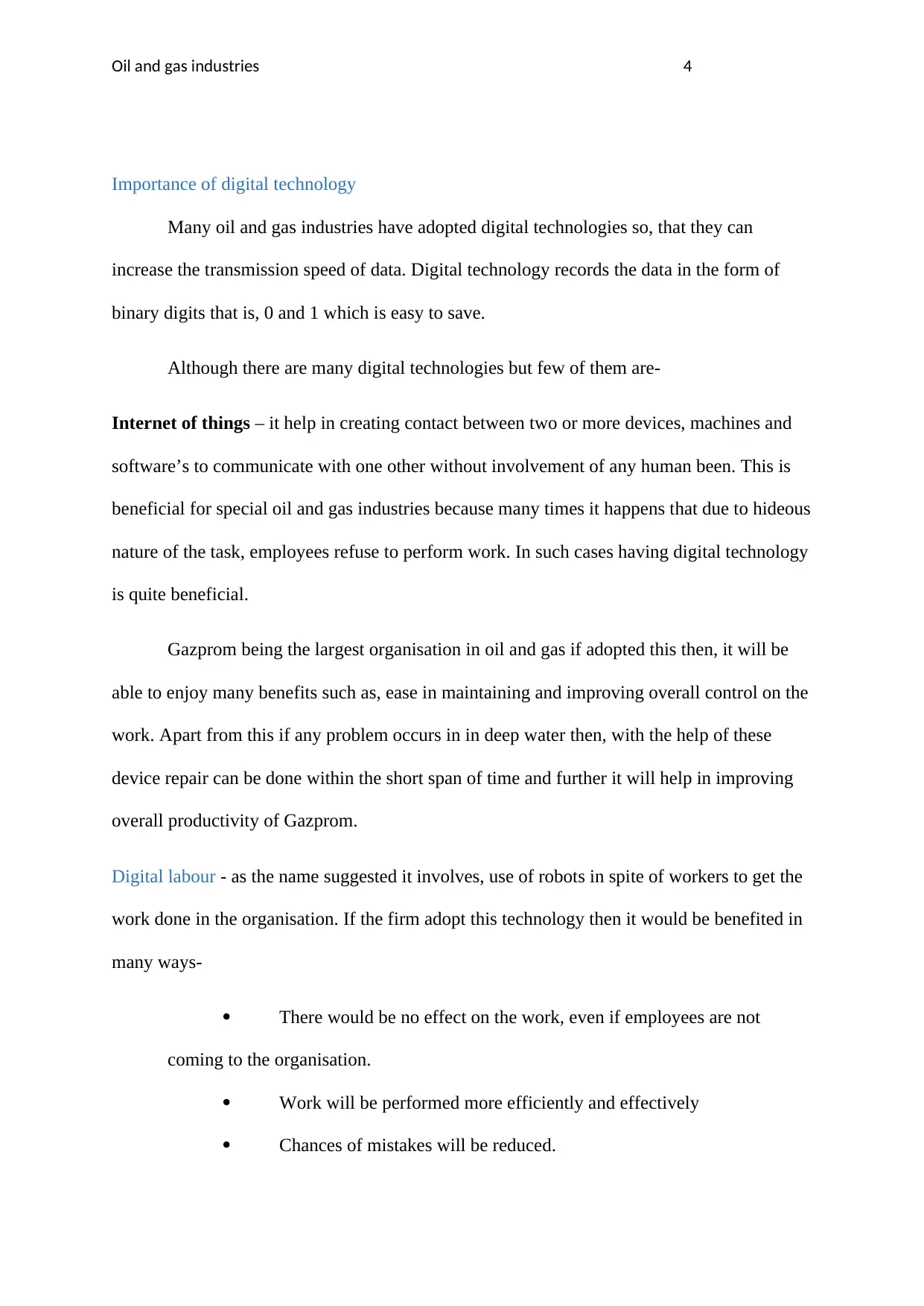
Oil and gas industries 4
Importance of digital technology
Many oil and gas industries have adopted digital technologies so, that they can
increase the transmission speed of data. Digital technology records the data in the form of
binary digits that is, 0 and 1 which is easy to save.
Although there are many digital technologies but few of them are-
Internet of things – it help in creating contact between two or more devices, machines and
software’s to communicate with one other without involvement of any human been. This is
beneficial for special oil and gas industries because many times it happens that due to hideous
nature of the task, employees refuse to perform work. In such cases having digital technology
is quite beneficial.
Gazprom being the largest organisation in oil and gas if adopted this then, it will be
able to enjoy many benefits such as, ease in maintaining and improving overall control on the
work. Apart from this if any problem occurs in in deep water then, with the help of these
device repair can be done within the short span of time and further it will help in improving
overall productivity of Gazprom.
Digital labour - as the name suggested it involves, use of robots in spite of workers to get the
work done in the organisation. If the firm adopt this technology then it would be benefited in
many ways-
There would be no effect on the work, even if employees are not
coming to the organisation.
Work will be performed more efficiently and effectively
Chances of mistakes will be reduced.
Importance of digital technology
Many oil and gas industries have adopted digital technologies so, that they can
increase the transmission speed of data. Digital technology records the data in the form of
binary digits that is, 0 and 1 which is easy to save.
Although there are many digital technologies but few of them are-
Internet of things – it help in creating contact between two or more devices, machines and
software’s to communicate with one other without involvement of any human been. This is
beneficial for special oil and gas industries because many times it happens that due to hideous
nature of the task, employees refuse to perform work. In such cases having digital technology
is quite beneficial.
Gazprom being the largest organisation in oil and gas if adopted this then, it will be
able to enjoy many benefits such as, ease in maintaining and improving overall control on the
work. Apart from this if any problem occurs in in deep water then, with the help of these
device repair can be done within the short span of time and further it will help in improving
overall productivity of Gazprom.
Digital labour - as the name suggested it involves, use of robots in spite of workers to get the
work done in the organisation. If the firm adopt this technology then it would be benefited in
many ways-
There would be no effect on the work, even if employees are not
coming to the organisation.
Work will be performed more efficiently and effectively
Chances of mistakes will be reduced.
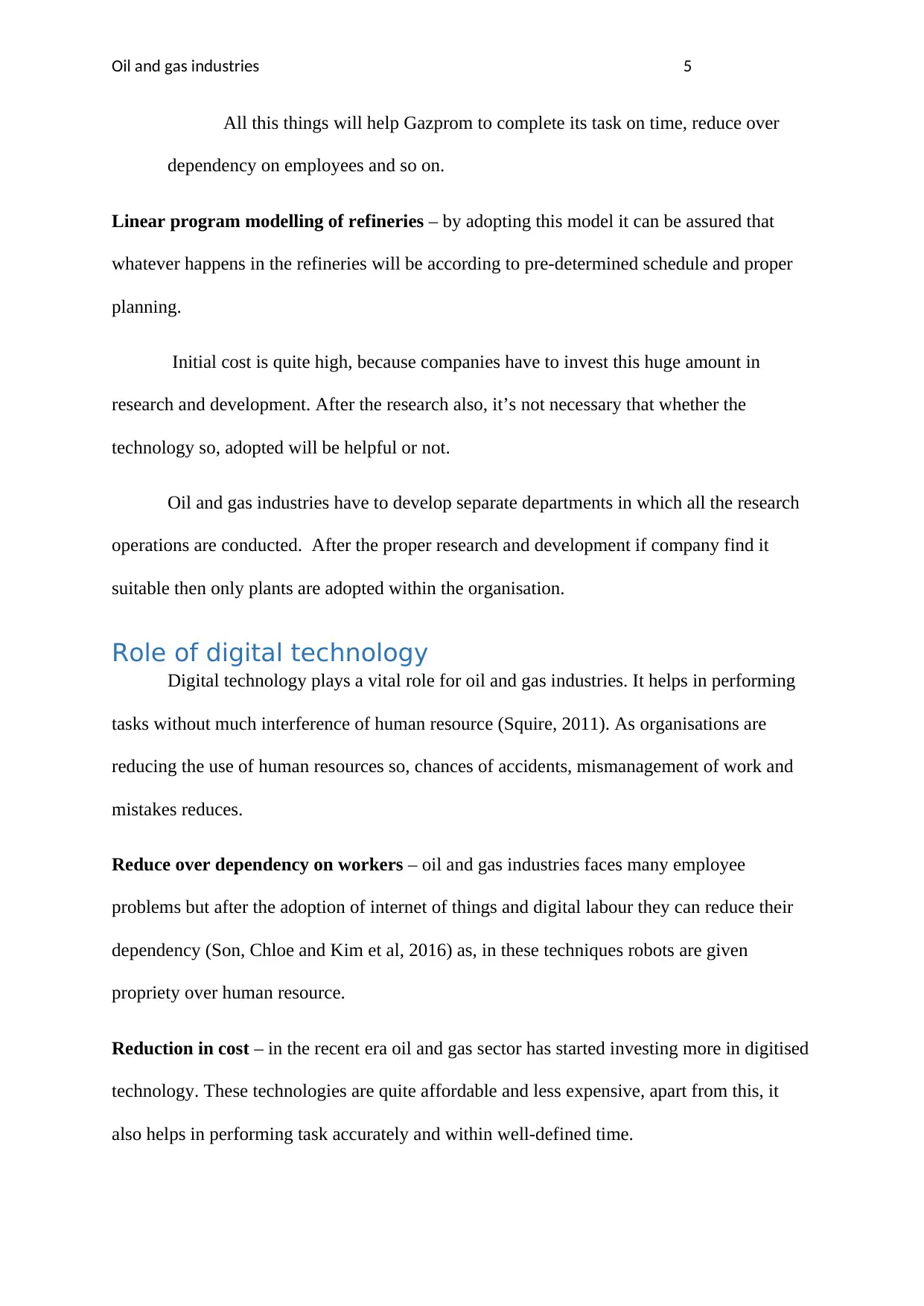
Oil and gas industries 5
All this things will help Gazprom to complete its task on time, reduce over
dependency on employees and so on.
Linear program modelling of refineries – by adopting this model it can be assured that
whatever happens in the refineries will be according to pre-determined schedule and proper
planning.
Initial cost is quite high, because companies have to invest this huge amount in
research and development. After the research also, it’s not necessary that whether the
technology so, adopted will be helpful or not.
Oil and gas industries have to develop separate departments in which all the research
operations are conducted. After the proper research and development if company find it
suitable then only plants are adopted within the organisation.
Role of digital technology
Digital technology plays a vital role for oil and gas industries. It helps in performing
tasks without much interference of human resource (Squire, 2011). As organisations are
reducing the use of human resources so, chances of accidents, mismanagement of work and
mistakes reduces.
Reduce over dependency on workers – oil and gas industries faces many employee
problems but after the adoption of internet of things and digital labour they can reduce their
dependency (Son, Chloe and Kim et al, 2016) as, in these techniques robots are given
propriety over human resource.
Reduction in cost – in the recent era oil and gas sector has started investing more in digitised
technology. These technologies are quite affordable and less expensive, apart from this, it
also helps in performing task accurately and within well-defined time.
All this things will help Gazprom to complete its task on time, reduce over
dependency on employees and so on.
Linear program modelling of refineries – by adopting this model it can be assured that
whatever happens in the refineries will be according to pre-determined schedule and proper
planning.
Initial cost is quite high, because companies have to invest this huge amount in
research and development. After the research also, it’s not necessary that whether the
technology so, adopted will be helpful or not.
Oil and gas industries have to develop separate departments in which all the research
operations are conducted. After the proper research and development if company find it
suitable then only plants are adopted within the organisation.
Role of digital technology
Digital technology plays a vital role for oil and gas industries. It helps in performing
tasks without much interference of human resource (Squire, 2011). As organisations are
reducing the use of human resources so, chances of accidents, mismanagement of work and
mistakes reduces.
Reduce over dependency on workers – oil and gas industries faces many employee
problems but after the adoption of internet of things and digital labour they can reduce their
dependency (Son, Chloe and Kim et al, 2016) as, in these techniques robots are given
propriety over human resource.
Reduction in cost – in the recent era oil and gas sector has started investing more in digitised
technology. These technologies are quite affordable and less expensive, apart from this, it
also helps in performing task accurately and within well-defined time.
⊘ This is a preview!⊘
Do you want full access?
Subscribe today to unlock all pages.

Trusted by 1+ million students worldwide
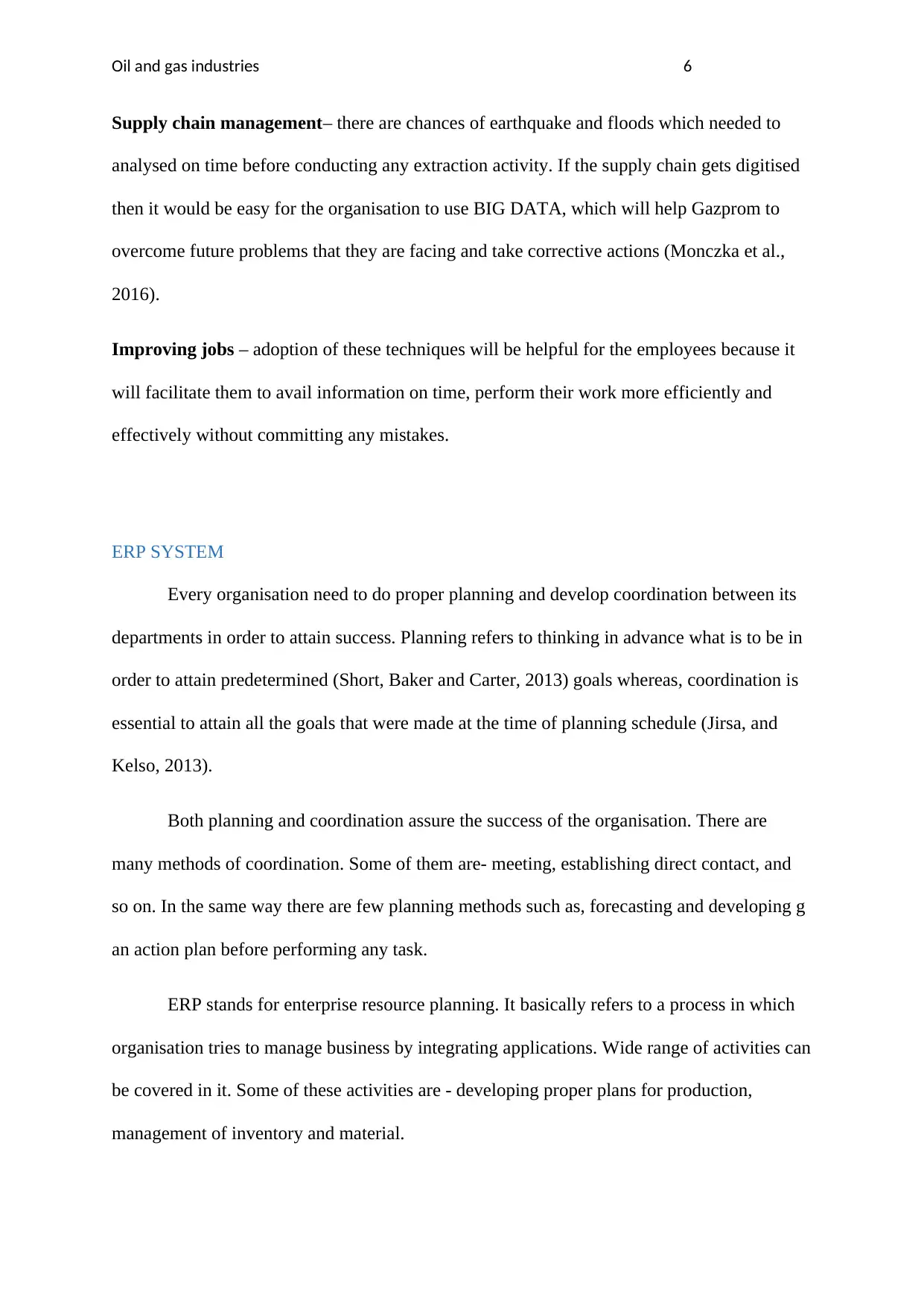
Oil and gas industries 6
Supply chain management– there are chances of earthquake and floods which needed to
analysed on time before conducting any extraction activity. If the supply chain gets digitised
then it would be easy for the organisation to use BIG DATA, which will help Gazprom to
overcome future problems that they are facing and take corrective actions (Monczka et al.,
2016).
Improving jobs – adoption of these techniques will be helpful for the employees because it
will facilitate them to avail information on time, perform their work more efficiently and
effectively without committing any mistakes.
ERP SYSTEM
Every organisation need to do proper planning and develop coordination between its
departments in order to attain success. Planning refers to thinking in advance what is to be in
order to attain predetermined (Short, Baker and Carter, 2013) goals whereas, coordination is
essential to attain all the goals that were made at the time of planning schedule (Jirsa, and
Kelso, 2013).
Both planning and coordination assure the success of the organisation. There are
many methods of coordination. Some of them are- meeting, establishing direct contact, and
so on. In the same way there are few planning methods such as, forecasting and developing g
an action plan before performing any task.
ERP stands for enterprise resource planning. It basically refers to a process in which
organisation tries to manage business by integrating applications. Wide range of activities can
be covered in it. Some of these activities are - developing proper plans for production,
management of inventory and material.
Supply chain management– there are chances of earthquake and floods which needed to
analysed on time before conducting any extraction activity. If the supply chain gets digitised
then it would be easy for the organisation to use BIG DATA, which will help Gazprom to
overcome future problems that they are facing and take corrective actions (Monczka et al.,
2016).
Improving jobs – adoption of these techniques will be helpful for the employees because it
will facilitate them to avail information on time, perform their work more efficiently and
effectively without committing any mistakes.
ERP SYSTEM
Every organisation need to do proper planning and develop coordination between its
departments in order to attain success. Planning refers to thinking in advance what is to be in
order to attain predetermined (Short, Baker and Carter, 2013) goals whereas, coordination is
essential to attain all the goals that were made at the time of planning schedule (Jirsa, and
Kelso, 2013).
Both planning and coordination assure the success of the organisation. There are
many methods of coordination. Some of them are- meeting, establishing direct contact, and
so on. In the same way there are few planning methods such as, forecasting and developing g
an action plan before performing any task.
ERP stands for enterprise resource planning. It basically refers to a process in which
organisation tries to manage business by integrating applications. Wide range of activities can
be covered in it. Some of these activities are - developing proper plans for production,
management of inventory and material.
Paraphrase This Document
Need a fresh take? Get an instant paraphrase of this document with our AI Paraphraser
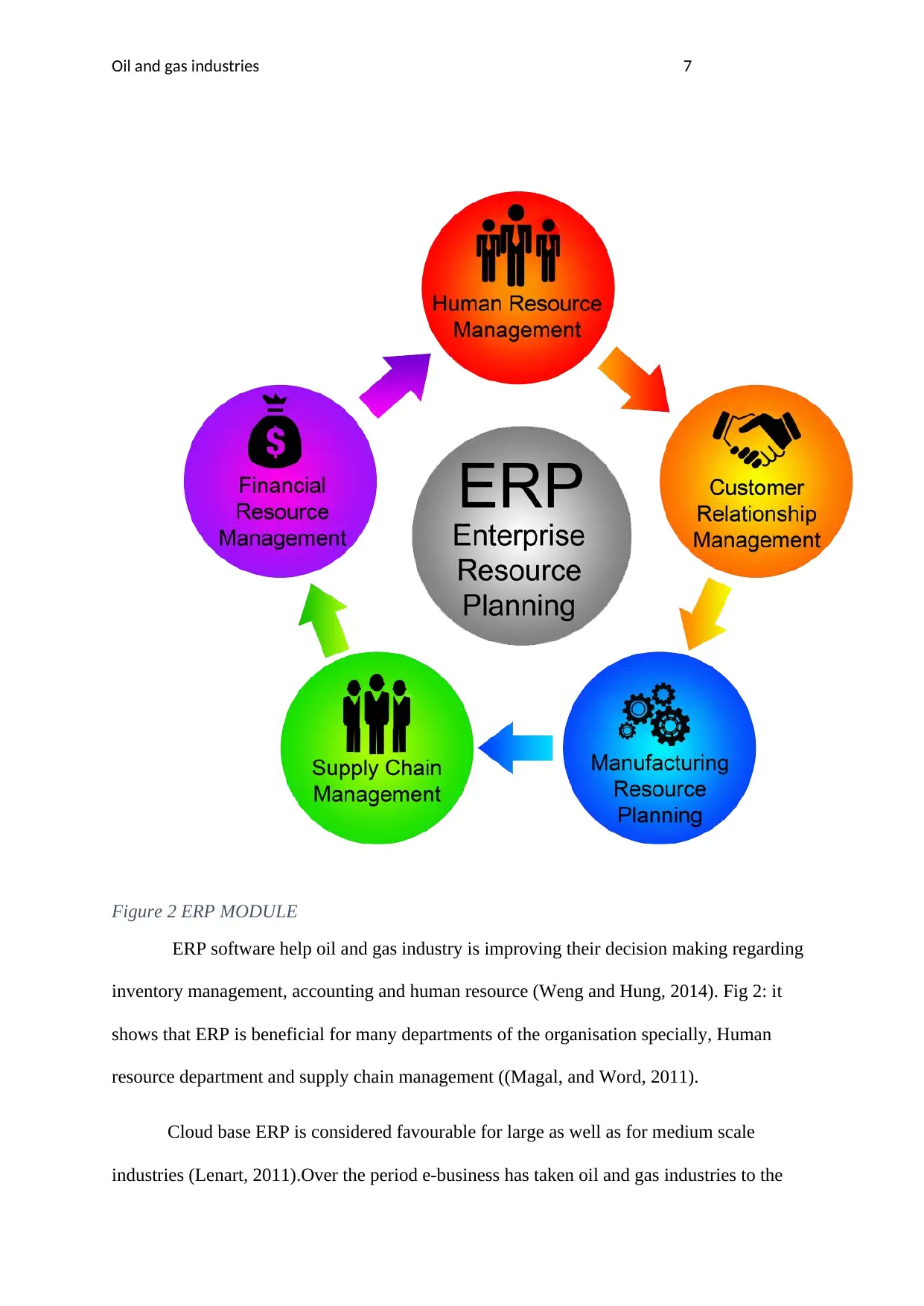
Oil and gas industries 7
Figure 2 ERP MODULE
ERP software help oil and gas industry is improving their decision making regarding
inventory management, accounting and human resource (Weng and Hung, 2014). Fig 2: it
shows that ERP is beneficial for many departments of the organisation specially, Human
resource department and supply chain management ((Magal, and Word, 2011).
Cloud base ERP is considered favourable for large as well as for medium scale
industries (Lenart, 2011).Over the period e-business has taken oil and gas industries to the
Figure 2 ERP MODULE
ERP software help oil and gas industry is improving their decision making regarding
inventory management, accounting and human resource (Weng and Hung, 2014). Fig 2: it
shows that ERP is beneficial for many departments of the organisation specially, Human
resource department and supply chain management ((Magal, and Word, 2011).
Cloud base ERP is considered favourable for large as well as for medium scale
industries (Lenart, 2011).Over the period e-business has taken oil and gas industries to the
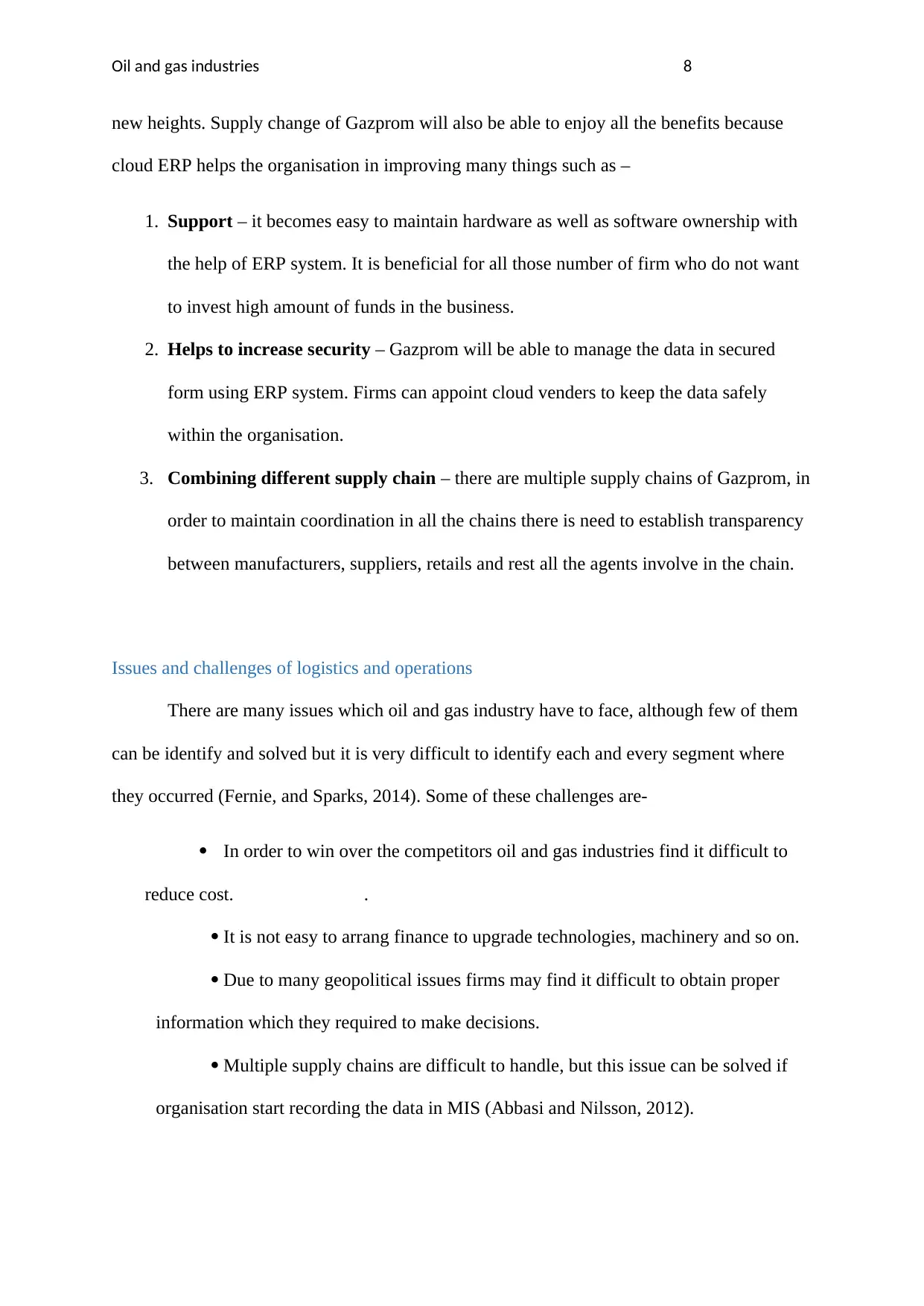
Oil and gas industries 8
new heights. Supply change of Gazprom will also be able to enjoy all the benefits because
cloud ERP helps the organisation in improving many things such as –
1. Support – it becomes easy to maintain hardware as well as software ownership with
the help of ERP system. It is beneficial for all those number of firm who do not want
to invest high amount of funds in the business.
2. Helps to increase security – Gazprom will be able to manage the data in secured
form using ERP system. Firms can appoint cloud venders to keep the data safely
within the organisation.
3. Combining different supply chain – there are multiple supply chains of Gazprom, in
order to maintain coordination in all the chains there is need to establish transparency
between manufacturers, suppliers, retails and rest all the agents involve in the chain.
Issues and challenges of logistics and operations
There are many issues which oil and gas industry have to face, although few of them
can be identify and solved but it is very difficult to identify each and every segment where
they occurred (Fernie, and Sparks, 2014). Some of these challenges are-
In order to win over the competitors oil and gas industries find it difficult to
reduce cost. .
It is not easy to arrang finance to upgrade technologies, machinery and so on.
Due to many geopolitical issues firms may find it difficult to obtain proper
information which they required to make decisions.
Multiple supply chains are difficult to handle, but this issue can be solved if
organisation start recording the data in MIS (Abbasi and Nilsson, 2012).
new heights. Supply change of Gazprom will also be able to enjoy all the benefits because
cloud ERP helps the organisation in improving many things such as –
1. Support – it becomes easy to maintain hardware as well as software ownership with
the help of ERP system. It is beneficial for all those number of firm who do not want
to invest high amount of funds in the business.
2. Helps to increase security – Gazprom will be able to manage the data in secured
form using ERP system. Firms can appoint cloud venders to keep the data safely
within the organisation.
3. Combining different supply chain – there are multiple supply chains of Gazprom, in
order to maintain coordination in all the chains there is need to establish transparency
between manufacturers, suppliers, retails and rest all the agents involve in the chain.
Issues and challenges of logistics and operations
There are many issues which oil and gas industry have to face, although few of them
can be identify and solved but it is very difficult to identify each and every segment where
they occurred (Fernie, and Sparks, 2014). Some of these challenges are-
In order to win over the competitors oil and gas industries find it difficult to
reduce cost. .
It is not easy to arrang finance to upgrade technologies, machinery and so on.
Due to many geopolitical issues firms may find it difficult to obtain proper
information which they required to make decisions.
Multiple supply chains are difficult to handle, but this issue can be solved if
organisation start recording the data in MIS (Abbasi and Nilsson, 2012).
⊘ This is a preview!⊘
Do you want full access?
Subscribe today to unlock all pages.

Trusted by 1+ million students worldwide
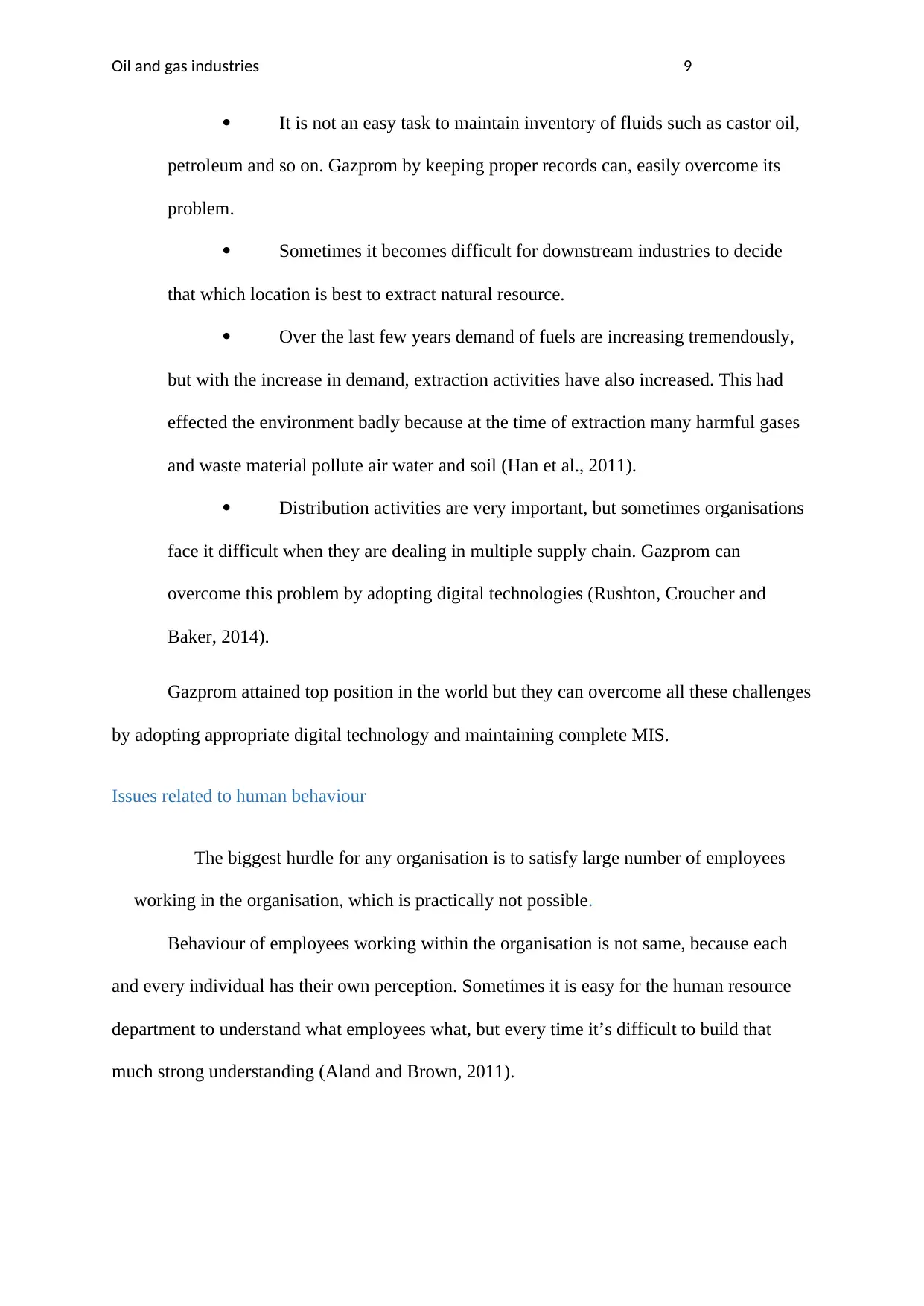
Oil and gas industries 9
It is not an easy task to maintain inventory of fluids such as castor oil,
petroleum and so on. Gazprom by keeping proper records can, easily overcome its
problem.
Sometimes it becomes difficult for downstream industries to decide
that which location is best to extract natural resource.
Over the last few years demand of fuels are increasing tremendously,
but with the increase in demand, extraction activities have also increased. This had
effected the environment badly because at the time of extraction many harmful gases
and waste material pollute air water and soil (Han et al., 2011).
Distribution activities are very important, but sometimes organisations
face it difficult when they are dealing in multiple supply chain. Gazprom can
overcome this problem by adopting digital technologies (Rushton, Croucher and
Baker, 2014).
Gazprom attained top position in the world but they can overcome all these challenges
by adopting appropriate digital technology and maintaining complete MIS.
Issues related to human behaviour
The biggest hurdle for any organisation is to satisfy large number of employees
working in the organisation, which is practically not possible.
Behaviour of employees working within the organisation is not same, because each
and every individual has their own perception. Sometimes it is easy for the human resource
department to understand what employees what, but every time it’s difficult to build that
much strong understanding (Aland and Brown, 2011).
It is not an easy task to maintain inventory of fluids such as castor oil,
petroleum and so on. Gazprom by keeping proper records can, easily overcome its
problem.
Sometimes it becomes difficult for downstream industries to decide
that which location is best to extract natural resource.
Over the last few years demand of fuels are increasing tremendously,
but with the increase in demand, extraction activities have also increased. This had
effected the environment badly because at the time of extraction many harmful gases
and waste material pollute air water and soil (Han et al., 2011).
Distribution activities are very important, but sometimes organisations
face it difficult when they are dealing in multiple supply chain. Gazprom can
overcome this problem by adopting digital technologies (Rushton, Croucher and
Baker, 2014).
Gazprom attained top position in the world but they can overcome all these challenges
by adopting appropriate digital technology and maintaining complete MIS.
Issues related to human behaviour
The biggest hurdle for any organisation is to satisfy large number of employees
working in the organisation, which is practically not possible.
Behaviour of employees working within the organisation is not same, because each
and every individual has their own perception. Sometimes it is easy for the human resource
department to understand what employees what, but every time it’s difficult to build that
much strong understanding (Aland and Brown, 2011).
Paraphrase This Document
Need a fresh take? Get an instant paraphrase of this document with our AI Paraphraser
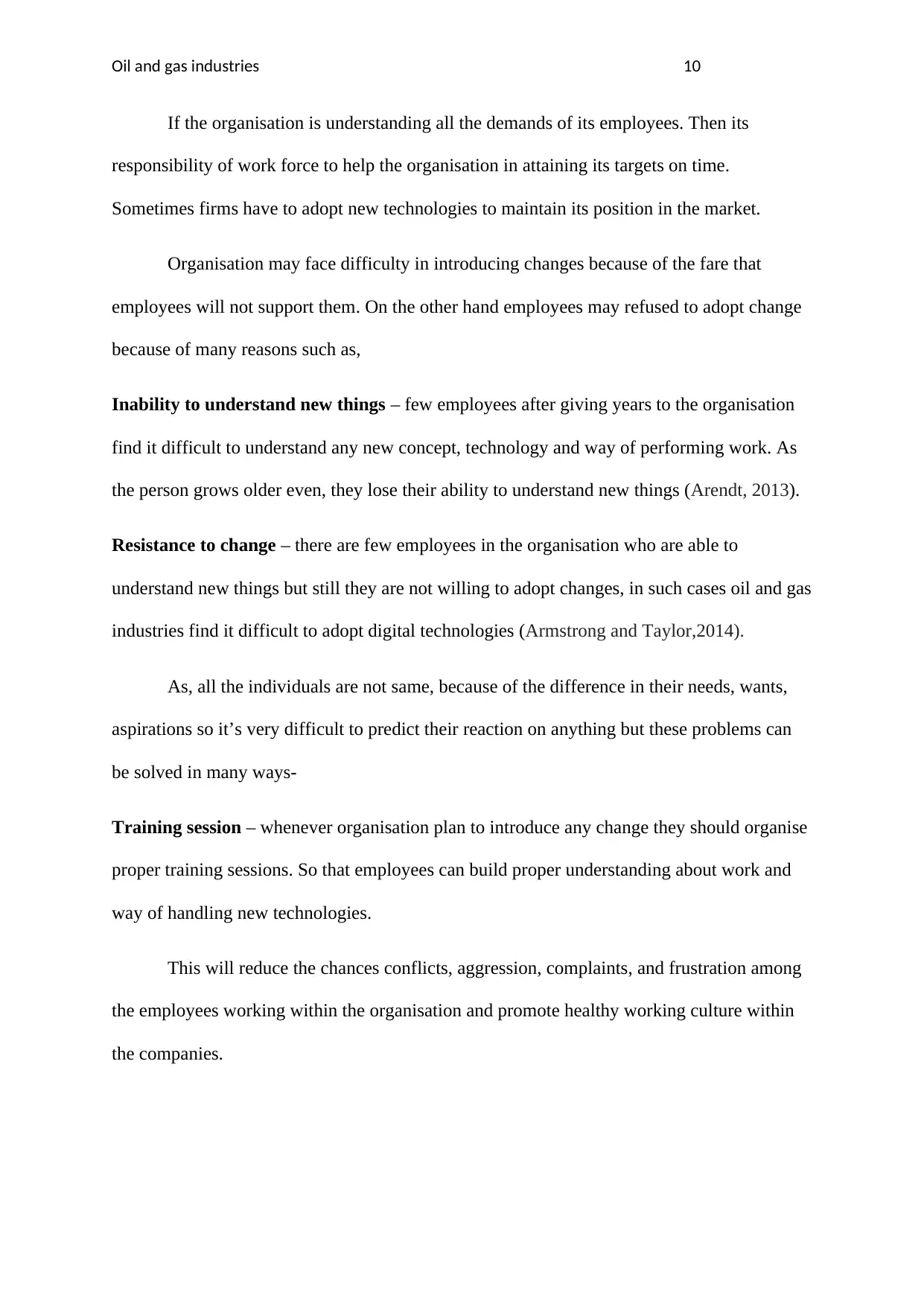
Oil and gas industries 10
If the organisation is understanding all the demands of its employees. Then its
responsibility of work force to help the organisation in attaining its targets on time.
Sometimes firms have to adopt new technologies to maintain its position in the market.
Organisation may face difficulty in introducing changes because of the fare that
employees will not support them. On the other hand employees may refused to adopt change
because of many reasons such as,
Inability to understand new things – few employees after giving years to the organisation
find it difficult to understand any new concept, technology and way of performing work. As
the person grows older even, they lose their ability to understand new things (Arendt, 2013).
Resistance to change – there are few employees in the organisation who are able to
understand new things but still they are not willing to adopt changes, in such cases oil and gas
industries find it difficult to adopt digital technologies (Armstrong and Taylor,2014).
As, all the individuals are not same, because of the difference in their needs, wants,
aspirations so it’s very difficult to predict their reaction on anything but these problems can
be solved in many ways-
Training session – whenever organisation plan to introduce any change they should organise
proper training sessions. So that employees can build proper understanding about work and
way of handling new technologies.
This will reduce the chances conflicts, aggression, complaints, and frustration among
the employees working within the organisation and promote healthy working culture within
the companies.
If the organisation is understanding all the demands of its employees. Then its
responsibility of work force to help the organisation in attaining its targets on time.
Sometimes firms have to adopt new technologies to maintain its position in the market.
Organisation may face difficulty in introducing changes because of the fare that
employees will not support them. On the other hand employees may refused to adopt change
because of many reasons such as,
Inability to understand new things – few employees after giving years to the organisation
find it difficult to understand any new concept, technology and way of performing work. As
the person grows older even, they lose their ability to understand new things (Arendt, 2013).
Resistance to change – there are few employees in the organisation who are able to
understand new things but still they are not willing to adopt changes, in such cases oil and gas
industries find it difficult to adopt digital technologies (Armstrong and Taylor,2014).
As, all the individuals are not same, because of the difference in their needs, wants,
aspirations so it’s very difficult to predict their reaction on anything but these problems can
be solved in many ways-
Training session – whenever organisation plan to introduce any change they should organise
proper training sessions. So that employees can build proper understanding about work and
way of handling new technologies.
This will reduce the chances conflicts, aggression, complaints, and frustration among
the employees working within the organisation and promote healthy working culture within
the companies.
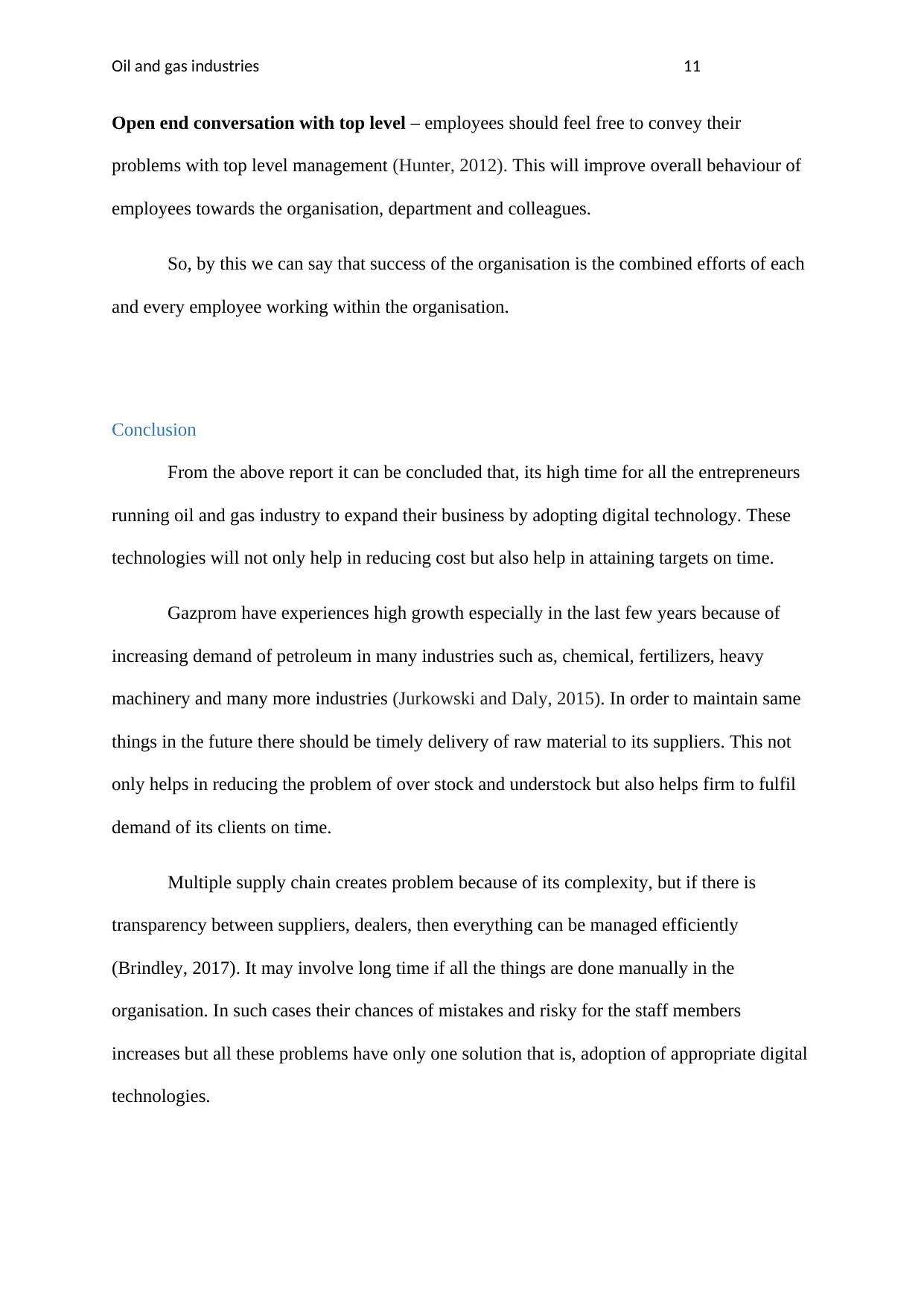
Oil and gas industries 11
Open end conversation with top level – employees should feel free to convey their
problems with top level management (Hunter, 2012). This will improve overall behaviour of
employees towards the organisation, department and colleagues.
So, by this we can say that success of the organisation is the combined efforts of each
and every employee working within the organisation.
Conclusion
From the above report it can be concluded that, its high time for all the entrepreneurs
running oil and gas industry to expand their business by adopting digital technology. These
technologies will not only help in reducing cost but also help in attaining targets on time.
Gazprom have experiences high growth especially in the last few years because of
increasing demand of petroleum in many industries such as, chemical, fertilizers, heavy
machinery and many more industries (Jurkowski and Daly, 2015). In order to maintain same
things in the future there should be timely delivery of raw material to its suppliers. This not
only helps in reducing the problem of over stock and understock but also helps firm to fulfil
demand of its clients on time.
Multiple supply chain creates problem because of its complexity, but if there is
transparency between suppliers, dealers, then everything can be managed efficiently
(Brindley, 2017). It may involve long time if all the things are done manually in the
organisation. In such cases their chances of mistakes and risky for the staff members
increases but all these problems have only one solution that is, adoption of appropriate digital
technologies.
Open end conversation with top level – employees should feel free to convey their
problems with top level management (Hunter, 2012). This will improve overall behaviour of
employees towards the organisation, department and colleagues.
So, by this we can say that success of the organisation is the combined efforts of each
and every employee working within the organisation.
Conclusion
From the above report it can be concluded that, its high time for all the entrepreneurs
running oil and gas industry to expand their business by adopting digital technology. These
technologies will not only help in reducing cost but also help in attaining targets on time.
Gazprom have experiences high growth especially in the last few years because of
increasing demand of petroleum in many industries such as, chemical, fertilizers, heavy
machinery and many more industries (Jurkowski and Daly, 2015). In order to maintain same
things in the future there should be timely delivery of raw material to its suppliers. This not
only helps in reducing the problem of over stock and understock but also helps firm to fulfil
demand of its clients on time.
Multiple supply chain creates problem because of its complexity, but if there is
transparency between suppliers, dealers, then everything can be managed efficiently
(Brindley, 2017). It may involve long time if all the things are done manually in the
organisation. In such cases their chances of mistakes and risky for the staff members
increases but all these problems have only one solution that is, adoption of appropriate digital
technologies.
⊘ This is a preview!⊘
Do you want full access?
Subscribe today to unlock all pages.

Trusted by 1+ million students worldwide
1 out of 14
Your All-in-One AI-Powered Toolkit for Academic Success.
+13062052269
info@desklib.com
Available 24*7 on WhatsApp / Email
![[object Object]](/_next/static/media/star-bottom.7253800d.svg)
Unlock your academic potential
Copyright © 2020–2025 A2Z Services. All Rights Reserved. Developed and managed by ZUCOL.
